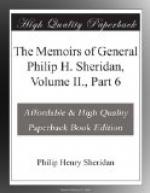A few hours after my arrival a delegation of prominent chiefs called on me and proposed a council, where they might discuss their grievances, and thus bring to the notice of the Government the alleged wrongs done them; but this I refused, because Congress had delegated to the Peace Commission the whole matter of treating with them, and a council might lead only to additional complications. My refusal left them without hope of securing better terms, or of even delaying matters longer; so henceforth they were more than ever reckless and defiant. Denunciations of the treaty became outspoken, and as the young braves grew more and more insolent every day, it amounted to conviction that, unless by some means the irritation was allayed, hostilities would surely be upon us when the buffalo returned to their summer feeding-grounds between the Arkansas and the Platte.
The principal sufferers in this event would be the settlers in middle and western Kansas, who, entirely ignorant of the dangers hanging over them, were laboring to build up homes in a new country. Hence the maintenance of peace was much to be desired, if it could be secured without too great concessions, and although I would not meet the different tribes in a formal council, yet, to ward off from settlers as much as possible the horrors of savage warfare, I showed, by resorting to persuasive methods, my willingness to temporize a good deal. An abundant supply of rations is usually effective to keep matters quiet in such cases, so I fed them pretty freely, and also endeavored to control them through certain men who, I found, because of former associations, had their confidence. These men, employed as scouts, or interpreters, were Mr. William Comstock, Mr. Abner S. Grover, and Mr. Richard Parr. They had lived on the Plains for many years with different tribes of Indians, had trapped and hunted with them, and knew all the principal chiefs and headmen. Through such influences, I thought I saw good chances of preserving peace, and of inducing the discontented to go quietly to their reservations in the Indian Territory as soon as General Hazen, the representative of the Peace Commissioners, was ready to conduct them there from Fort Larned.
Before returning to Leavenworth I put my mediators (as I may call them) under charge of an officer of the army, Lieutenant F. W. Beecher, a very intelligent man, and directed him to send them out to visit among the different tribes, in order to explain what was intended by the treaty of Medicine Lodge, and to make every effort possible to avert hostilities. Under these instructions Comstock and Grover made it their business to go about among the Cheyennes—the most warlike tribe of all—then camping about the headwaters of Pawnee and Walnut creeks, and also to the north and west of Fort Wallace, while Parr spent his time principally with the Kiowas and Comanches.




